Unit 9 Section A 1a~2d【人教八下英语情境课堂课件内嵌音视频】Unit 9 Have you ever been to a museum?
文档属性
| 名称 | Unit 9 Section A 1a~2d【人教八下英语情境课堂课件内嵌音视频】Unit 9 Have you ever been to a museum? |

|
|
| 格式 | pptx | ||
| 文件大小 | 22.4MB | ||
| 资源类型 | 试卷 | ||
| 版本资源 | 人教新目标(Go for it)版 | ||
| 科目 | 英语 | ||
| 更新时间 | 2025-05-20 00:00:00 | ||
图片预览

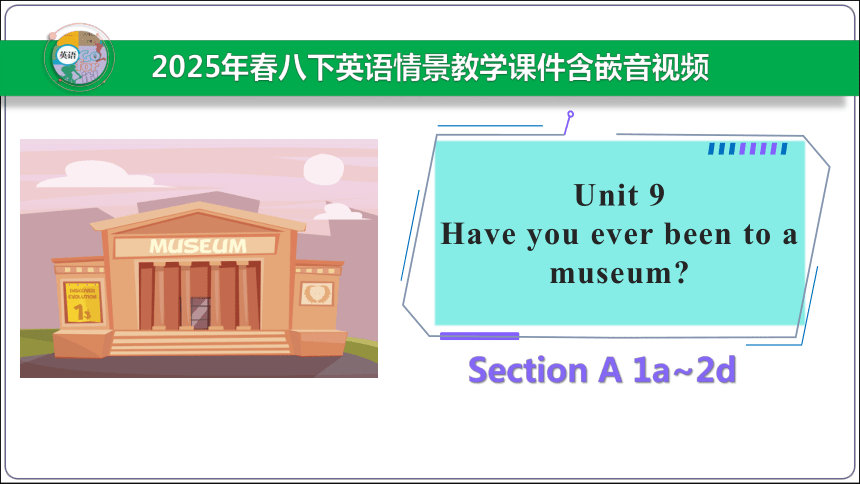
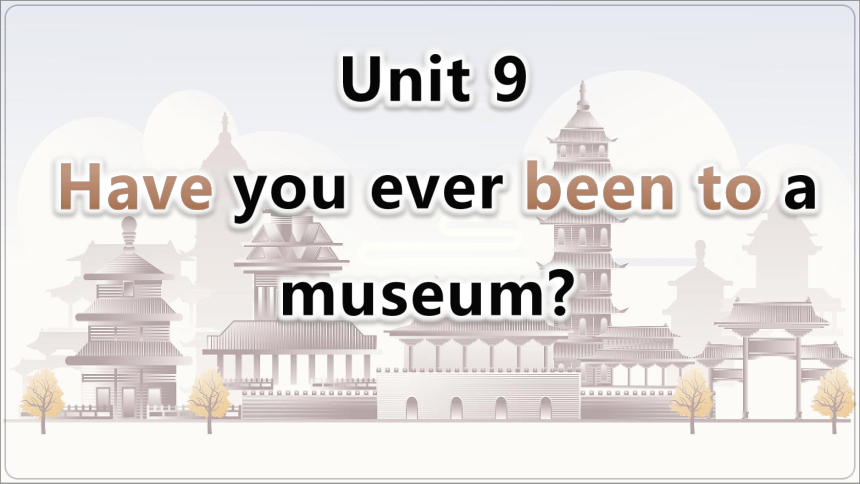

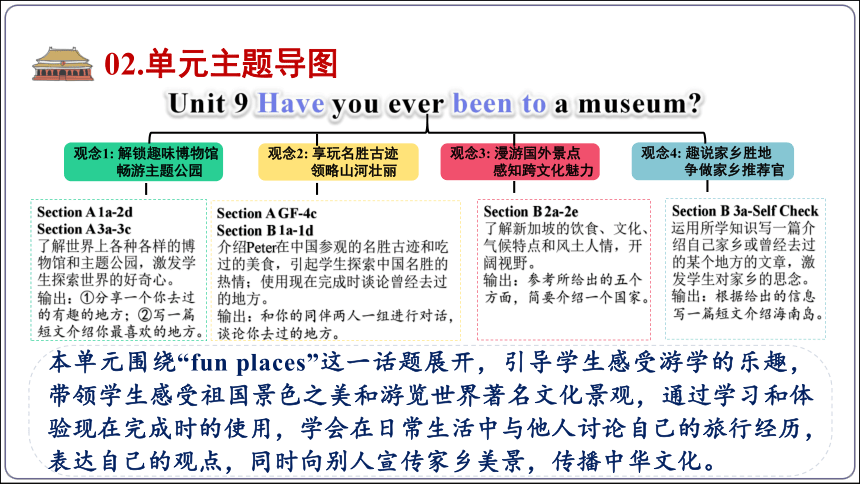

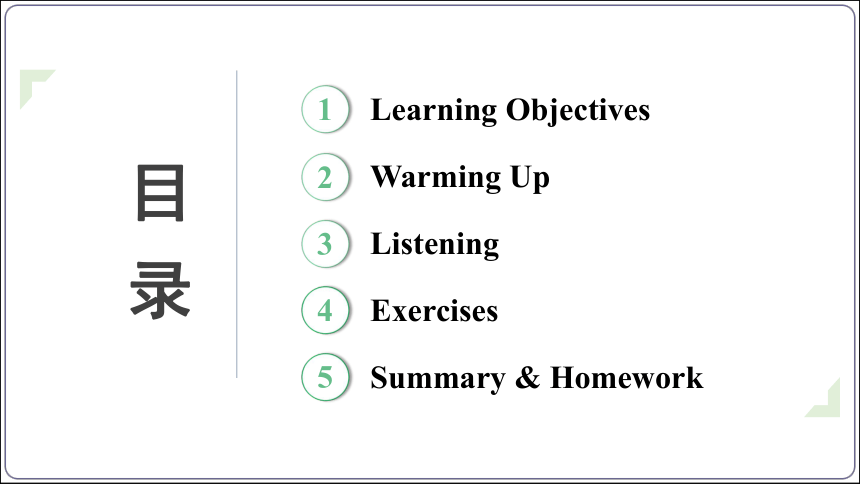
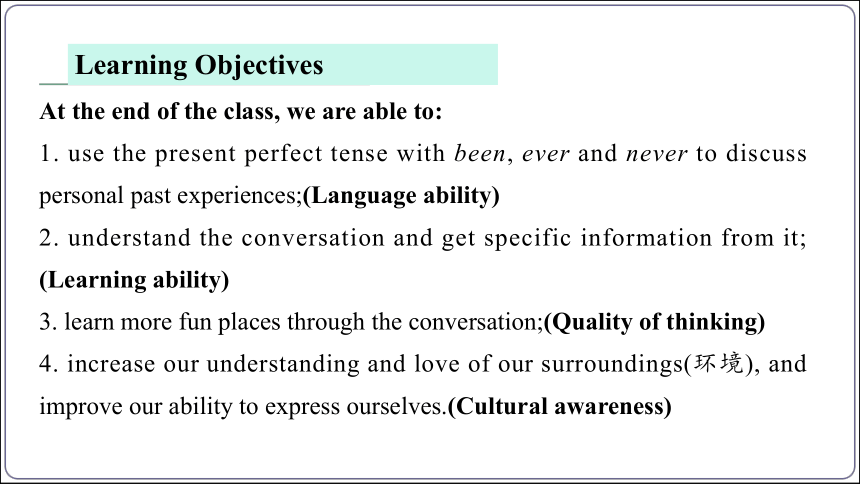
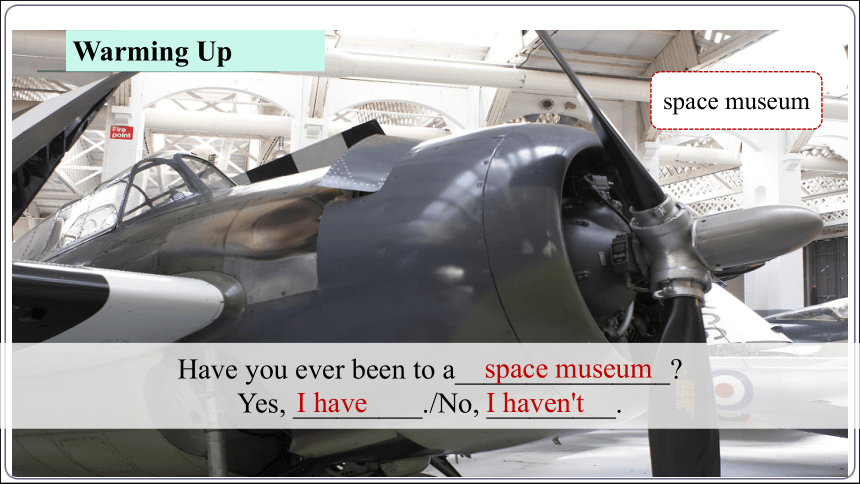
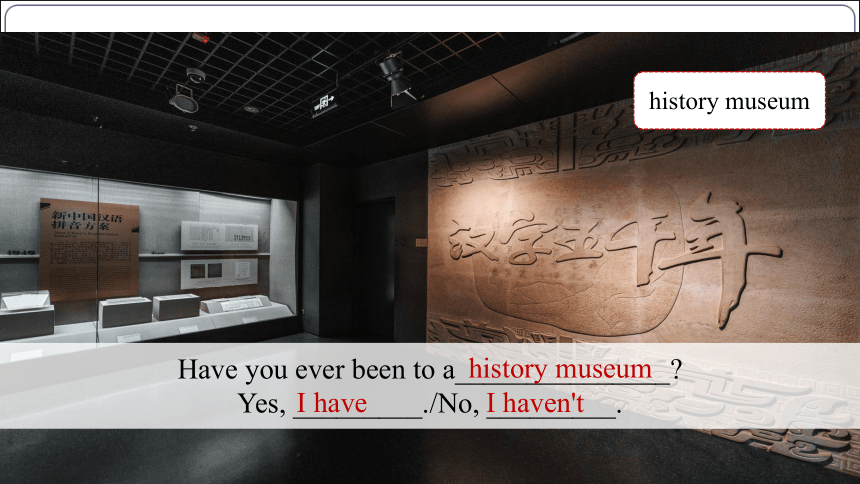
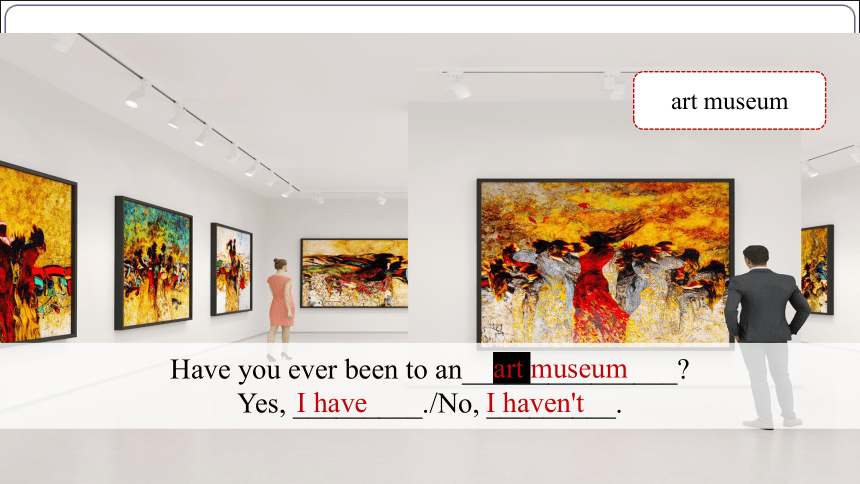
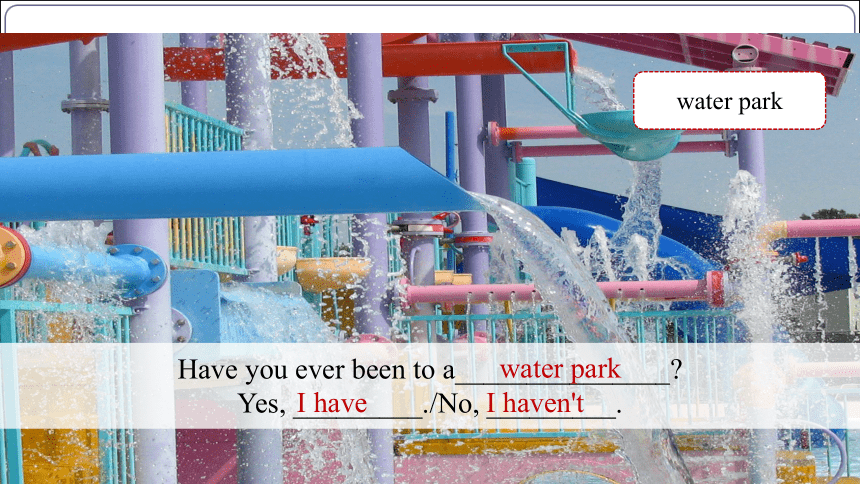
文档简介
(共54张PPT)
统编八下英语
同步精品课件
人教版八年级下册
2025年春八下英语情景教学课件含嵌音视频
Unit 9
Have you ever been to a museum
Section A 1a~2d
Have you ever been to a museum
Unit 9
本单元以“有趣的地方(Fun places)” 为话题,属于2022年版课标中“人与社会”范畴内的“历史、社会与文化”主题下“世界主要国家的文化习俗与文化景观、节假日与庆祝活动”子主题。
01.单元主题
Unit 9 Have you ever been to a museum
观念1: 解锁趣味博物馆
畅游主题公园
观念4: 趣说家乡胜地
争做家乡推荐官
观念2: 享玩名胜古迹
领略山河壮丽
观念3: 漫游国外景点
感知跨文化魅力
Section A 1a-2d
Section A 3a-3c
了解世界上各种各样的博物馆和主题公园,激发学生探索世界的好奇心。
输出:①分享一个你去过的有趣的地方;②写一篇短文介绍你最喜欢的地方。
Section A GF-4c
Section B 1a-1d
介绍Peter在中国参观的名胜古迹和吃过的美食,引起学生探索中国名胜的热情;使用现在完成时谈论曾经去过的地方。
输出:和你的同伴两人一组进行对话,谈论你去过的地方。
Section B 2a-2e
了解新加坡的饮食、文化、气候特点和风土人情,开阔视野。
输出:参考所给出的五个方面,简要介绍一个国家。
Section B 3a-Self Check
运用所学知识写一篇介绍自己家乡或曾经去过的某个地方的文章,激发学生对家乡的思念。
输出:根据给出的信息写一篇短文介绍海南岛。
本单元围绕“fun places”这一话题展开,引导学生感受游学的乐趣, 带领学生感受祖国景色之美和游览世界著名文化景观,通过学习和体验现在完成时的使用,学会在日常生活中与他人讨论自己的旅行经历,表达自己的观点,同时向别人宣传家乡美景,传播中华文化。
02.单元主题导图
At the end of the class, students should:
1. master vocabularies related to museums and tourist attractions, flexibly use the present perfect tense to discuss past experiences and enjoy the pleasure of traveling;(Learn& Understand)
2. use what they have learned to actively share their travel experiences and feel the cultural diversity;(Apply&Analyze)
3. express their opinions by writing a short English essay about their hometown or a place they have been to and understand the cultural significance of the topic in this unit.
(Evaluate &Create)
03.单元教学目标
目 录
1
Learning Objectives
2
Warming Up
3
Listening
5
Summary & Homework
4
Exercises
At the end of the class, we are able to:
1. use the present perfect tense with been, ever and never to discuss personal past experiences;(Language ability)
2. understand the conversation and get specific information from it; (Learning ability)
3. learn more fun places through the conversation;(Quality of thinking)
4. increase our understanding and love of our surroundings(环境), and improve our ability to express ourselves.(Cultural awareness)
Learning Objectives
Warming Up
Have you ever been to a_______________
Yes, _________./No, _________.
space museum
I have
I haven't
space museum
Have you ever been to a_______________
Yes, _________./No, _________.
history museum
I have
I haven't
history museum
Have you ever been to an_______________
Yes, _________./No, _________.
art museum
I have
I haven't
art museum
Have you ever been to a_______________
Yes, _________./No, _________.
water park
I have
I haven't
water park
Have you ever been to a_______________
Yes, _________./No, _________.
zoo
I have
I haven't
zoo
Have you ever been to an_______________
Yes, _________./No, _________.
amusement park
I have
I haven't
amusement park
What are the two girls in the picture talking about
Pre-listening
Places
Past experiences
Plans
1a Which of these places would you like to visit Rank them from 1 (most) to 6 (least).
space museum____ history museum____ art museum_____ water park____ zoo_____ amusement park_____
n./ 'mju zm nt/
1b Listen. Have these students ever been to these places Check (√) the boxes.
Name Science museum History museum Art museum Nature museum Space
museum
Claudia
Sarah
√
√
√
√
√
√
While-listening
1. When did Sarah go to the National Science Museum
2. Has Sarah been to a history museum
3. What does Claudia say about history
She went there last year.
No, she hasn't.
She is not interested in history.
Now, listen again and answer the following questions.
Conversation
Sarah: I’m bored, Claudia. Let’s do something interesting.
Claudia: Have you ever been to a science museum ①
Sarah: Yes, I have. I went to the National Science Museum last year.
Have you ever been to a history museum
Claudia: No, I haven’t.
Sarah: Me neither.② Let’s go to one tomorrow.
Claudia: Well, that sounds good, but I’m not interested in history.
Click to learn more!
当形容词修饰不定代词something,anything,nothing等时,形容词要放在不定代词的后面
Sarah: Really I didn’t know that. Well, how about the art museum
Have you been to the art museum
Claudia: I’ve been to the art museum many times.
Sarah: Me, too. But I’d like to go again. Hmm, let’s see… how about
the nature museum I’ve been there a few times.
Claudia: So have I. I went there on our last school trip.
Sarah: I know. Let’s go to the space museum. I’ve never been there.
Claudia: That’s a great idea. I went there last year, but I’d like to go
there again.
=what about ...
1c Ask and answer questions about the places in 1b.
A: Let’s go somewhere different today.
B: OK. Where do you want to go
A: Have you ever been to the space museum
B: No, I haven’t. How about you
A: …
adv./ s mwe /
Let’s go somewhere different today.
OK. Where do you want to go
No, I haven’t. How about you
...
Have you ever been to the nature museum
Your Time
2a Look at the map of the town. What places can you see on the map
2a Listen and circle the places you hear.
2b Listen again and circle T for true or F for false.
Conversation 1 Conversation 2 Conversation 3
1. Tina went to the
space museum last year. T/F
2. John has never
been to the space
museum. T/F
3. They are going
to take the subway.
T/F
1. Linda has been to
the amusement park.
T/F
2. Linda went to the
amusement park
yesterday. T/F
3. Linda is going to the
amusement park
again by bike. T/F
1. Frank had a great
time at the water park.
T/F
2. Frank’s friend has
never been to the
water park. T/F
3. Frank and his friend are going skating.
T/F
Conversation 1
John: Hey, have you ever visited the space museum, Tina
Tina: Yes, I went there last year. Have you ever been there, John
John: No, I haven’t.
Tina: Well, I’d really like to go there again.
John: Great. What bus do we take to get to the museum
Tina: We can take the subway. The station is near the museum.
=by subway
Conversation 2
Kim: Hi, Linda. Have you ever been to the amusement park
Linda: Yes, I have, but a long time ago. I remember it was really fun.
There were so many exciting things to do there.
Kim: Do you want to go again next week
Linda: Sure. I think that would be a great idea.
Kim: Do you think we can ride our bikes there
Linda: Of course! It’s not very far away. It’s just on Green Street,
behind the zoo.
Conversation 3
Tom: Have you ever been to the water park, Frank
Frank: No, I’ve never been there.
Tom: Neither have I. Let’s go there together!
Frank: I’d really love to go, but I don’t have any money.
Tom: Well, let’s go skating instead. There’s a great new place for
skating in River Park on Center Street.
Frank: That’s a great idea. Could I borrow your bike I want to go
home to get my skates.
2c Look at the map in 2a and make conversations about the places.
A: Have you ever been to the space museum
B: Yes, I have. How about you
A: No, I haven’t.
B: Oh, it’s fantastic. Let’s go tomorrow.
A: OK. How are we going to get there
B: We can take the subway.
Have you ever been to the water park
Yes, I have. How about you
Oh, it’s fantastic. Let’s go tomorrow.
OK. How are we going to get there
We can go there by bus.
No, I haven’t.
Your Time
Read the conversation in 2d and answer the questions.
1. When did Jill go to the film museum
2. What does Jill love about the film museum
3. What did Jill learn about
In April.
She loves all the old movie cameras.
She learned about the inventions that led to color movies.
4.Who did Jill camp with on the weekend
5. Has Anna ever been camping
With her friends.
No, she hasn’t.
2d Role-play the conversation.
Anna: I went to the film museum last weekend. Have you ever been there
Jill: Yes, I have. I went there back in April.
Anna: It’s really interesting, isn’t it It’s a great way to spend a Saturday afternoon.③
Jill: Yes, I love all the old movie cameras there. I learned about the inventions that led to color movies, too.
Anna: So, what did you do on the weekend
n./ k m r /
n./ n ven n /
It is a good way to do sth.
lead to
Jill: I camped in the mountains with some friends. We put up a tent and cooked outside.
Anna: That sounds fun. I’ve never been camping.
Disappearing dialogue
Anna: I went to the film museum last weekend._______________________
Jill: Yes, I have. I went there back in April.
Anna: It’s really interesting, isn’t it ________________________________
_________
Jill: Yes, I love all the old movie cameras there._______________________
__________________________________
Have you ever been there
It’s a great way to spend a Saturday
inventions that led to color movies, too.
Post-listening
afternoon.
I learned about the
Anna: So, what did you do on the weekend
Jill: __________________________________________________________
_____________
Anna: That sounds fun. I’ve never been camping.
I camped in the mountains with some friends. We put up a tent and cooked outside.
游乐场
……怎么样 (=what about ... )
乘地铁 (=by subway)
遥远的地方
去滑冰
这是做某事的好方法
了解
导致
搭帐篷
Key Phrases
amusement park
how about...
go skating
take the subway
it is a good way to do sth.
far away
lead to
put up a tent
learn about
1. Have you ever been to a science museum
意为“曾经去过”,说话时已不在去过的地方,常与ever, never, just等连用。后可接次数,如once, twice, three times 等,表示“去过某地几次”。
have been to
虽然我已经去过青海湖两次了,但我不介意再来一次。
e.g. Although I have been to Qinghai Lake twice, I don't mind visiting it a third time.
Language Points
have gone to
意为“去了某地”,表示到了某地或正在去某地的途中,总之说话时该人不在现场,一般不用第一、二人称作主语。
e.g. They have gone to Beijing.
他们已经去北京了。
1. 凡是去过大连的人都说大连很美。
Those who ________________ Dalian all say it’s beautiful.
2. 我父母已经去杭州度假了。
My parents ________________ Hangzhou for holiday.
have been to
have gone to
返回
Instant Training
2. No, I haven’t. Me neither.
Me neither 表示自身的情况与前面的否定情况一样,相当于 Neither/ Nor have I。
“Neither/Nor + 情态动词/助动词/be动词 + 主语” 表示所描述的否定情况也同样适用于另一个人/物。
e.g. — I don’t like summer. It’s too hot.
— Me neither. (= Neither do I.)
— 我不喜欢夏天。太热了。
— 我也不喜欢。(我也是。)
【拓展】
① 若表示自己的情况和前面的肯定情况一样,
则用 Me too 或“So + 情态动词/助动词/be 动词+I”。
e.g. — I often go to the library.
— 我经常去图书馆。
— Me too.(=So do I.)
— 我也是。
② neither pron. 两者都不
e.g. Neither answer is correct.
两个答案都不对。
Neither of them has/have a car.
他们两个都没有汽车。
③ neither adv.(否定的陈述同样适用于其他人或物)也不
e.g. Jack didn’t remember and neither did I.
Jack没记住,我也忘了。
Their house is neither big nor small.
他们的房子不大也不小。
返回
1. Leo不是医生。我也不是。
Leo is not a doctor. _________________________
2. 这两道物理题都不难,王华很轻松地就做出来了。
________ ________the physics problems is difficult. Wang Hua worked them out easily.
Me neither. / Neither am I.
Neither of
Instant Training
3. It’s a great way to spend a Saturday afternoon.
(1)表示“花(时间);度过”时:
① spend sth. (on sth.)
e.g. It's necessary for us to spend some time on our hobbies.
我们有必要花一些时间在我们的爱好上。
② spend sth. (doing sth./in doing sth.)
e.g.Tom loves English novels, so he spends a lot of time reading them in the library.
汤姆喜欢英语小说,所以他花很多时间在图书馆。
Many people regret spending too much time in watching short videos.
许多人后悔花费太多时间来浏览短视频。
(2)表示“用,花(钱)”时:
③ spend sth. (on sth./on doing sth.)
e.g. I’ve spent all my money already.
我已经把我的钱全都花完了。
Mia spent £100 on a new dress.
Mia花100英镑买了一条新连衣裙。
返回
1. 我大多数空余时间都在阅读,我还订购了很多报纸、杂志。
I ________ most of my spare time _________ and I subscribe to various newspapers, magazines.
2. 这幢气派的大楼花了大量的钱。
Large amounts of money were ______ ______ the magnificent building.
spend
reading
spent on
Instant Training
1.(2023龙东地区)—It was the Dragon Boat Festival last Thursday. I watched the boat races by the lake.
—________ , but I didn’t see you there.
A. So did I B. So I did C. Neither did I
2.(2023哈尔滨)—Where is your father, Dandan
-Oh , he ________ Beijing on business and he’ll come back next week.
A. has returned from B. has been to C. has gone to
一、单项选择。
A
C
Exercises
3. I _____ to the West Lake four times, but I will go there again this summer.
A. have gone B. have been C. went D. had gone
4. —I have never been to London. — _____ have I.
A. Neither B. So C. Also D. Well
5. Let’s go ____ today.
A. somewhere different B. different somewhere
C. anywhere different D. different anywhere
A
B
A
我去过西安两次。
I ______ ______ _____ Xi’an twice.
2. 大声读书是一种学习英语的好方法。
Reading aloud is _____ ______ _____ ____ learn English.
3. 我了解了一些电影的知识。
I _________ ______ some information about movies.
4. 吃太多冰淇淋可能会导致胃病。
Eating too much ice cream may _____ _____ stomach problems.
二、完成句子。
learned about
have been to
a good way to
lead to
1. Key structures:
—Have you ever been to a science museum
—No, I have never been to a science museum.
—Have you ever visited the space museum
—Yes, I have. I went there last year.
—I've never been to a water park.
—Me neither.
2. Key words and expressions:
amusement, somewhere, camera, invention, amusement park
Summary
Share a fun place with your deskmate you have been to before.
Homework
谢谢
21世纪教育网(www.21cnjy.com)
中小学教育资源网站
兼职招聘:
https://www.21cnjy.com/recruitment/home/admin
统编八下英语
同步精品课件
人教版八年级下册
2025年春八下英语情景教学课件含嵌音视频
Unit 9
Have you ever been to a museum
Section A 1a~2d
Have you ever been to a museum
Unit 9
本单元以“有趣的地方(Fun places)” 为话题,属于2022年版课标中“人与社会”范畴内的“历史、社会与文化”主题下“世界主要国家的文化习俗与文化景观、节假日与庆祝活动”子主题。
01.单元主题
Unit 9 Have you ever been to a museum
观念1: 解锁趣味博物馆
畅游主题公园
观念4: 趣说家乡胜地
争做家乡推荐官
观念2: 享玩名胜古迹
领略山河壮丽
观念3: 漫游国外景点
感知跨文化魅力
Section A 1a-2d
Section A 3a-3c
了解世界上各种各样的博物馆和主题公园,激发学生探索世界的好奇心。
输出:①分享一个你去过的有趣的地方;②写一篇短文介绍你最喜欢的地方。
Section A GF-4c
Section B 1a-1d
介绍Peter在中国参观的名胜古迹和吃过的美食,引起学生探索中国名胜的热情;使用现在完成时谈论曾经去过的地方。
输出:和你的同伴两人一组进行对话,谈论你去过的地方。
Section B 2a-2e
了解新加坡的饮食、文化、气候特点和风土人情,开阔视野。
输出:参考所给出的五个方面,简要介绍一个国家。
Section B 3a-Self Check
运用所学知识写一篇介绍自己家乡或曾经去过的某个地方的文章,激发学生对家乡的思念。
输出:根据给出的信息写一篇短文介绍海南岛。
本单元围绕“fun places”这一话题展开,引导学生感受游学的乐趣, 带领学生感受祖国景色之美和游览世界著名文化景观,通过学习和体验现在完成时的使用,学会在日常生活中与他人讨论自己的旅行经历,表达自己的观点,同时向别人宣传家乡美景,传播中华文化。
02.单元主题导图
At the end of the class, students should:
1. master vocabularies related to museums and tourist attractions, flexibly use the present perfect tense to discuss past experiences and enjoy the pleasure of traveling;(Learn& Understand)
2. use what they have learned to actively share their travel experiences and feel the cultural diversity;(Apply&Analyze)
3. express their opinions by writing a short English essay about their hometown or a place they have been to and understand the cultural significance of the topic in this unit.
(Evaluate &Create)
03.单元教学目标
目 录
1
Learning Objectives
2
Warming Up
3
Listening
5
Summary & Homework
4
Exercises
At the end of the class, we are able to:
1. use the present perfect tense with been, ever and never to discuss personal past experiences;(Language ability)
2. understand the conversation and get specific information from it; (Learning ability)
3. learn more fun places through the conversation;(Quality of thinking)
4. increase our understanding and love of our surroundings(环境), and improve our ability to express ourselves.(Cultural awareness)
Learning Objectives
Warming Up
Have you ever been to a_______________
Yes, _________./No, _________.
space museum
I have
I haven't
space museum
Have you ever been to a_______________
Yes, _________./No, _________.
history museum
I have
I haven't
history museum
Have you ever been to an_______________
Yes, _________./No, _________.
art museum
I have
I haven't
art museum
Have you ever been to a_______________
Yes, _________./No, _________.
water park
I have
I haven't
water park
Have you ever been to a_______________
Yes, _________./No, _________.
zoo
I have
I haven't
zoo
Have you ever been to an_______________
Yes, _________./No, _________.
amusement park
I have
I haven't
amusement park
What are the two girls in the picture talking about
Pre-listening
Places
Past experiences
Plans
1a Which of these places would you like to visit Rank them from 1 (most) to 6 (least).
space museum____ history museum____ art museum_____ water park____ zoo_____ amusement park_____
n./ 'mju zm nt/
1b Listen. Have these students ever been to these places Check (√) the boxes.
Name Science museum History museum Art museum Nature museum Space
museum
Claudia
Sarah
√
√
√
√
√
√
While-listening
1. When did Sarah go to the National Science Museum
2. Has Sarah been to a history museum
3. What does Claudia say about history
She went there last year.
No, she hasn't.
She is not interested in history.
Now, listen again and answer the following questions.
Conversation
Sarah: I’m bored, Claudia. Let’s do something interesting.
Claudia: Have you ever been to a science museum ①
Sarah: Yes, I have. I went to the National Science Museum last year.
Have you ever been to a history museum
Claudia: No, I haven’t.
Sarah: Me neither.② Let’s go to one tomorrow.
Claudia: Well, that sounds good, but I’m not interested in history.
Click to learn more!
当形容词修饰不定代词something,anything,nothing等时,形容词要放在不定代词的后面
Sarah: Really I didn’t know that. Well, how about the art museum
Have you been to the art museum
Claudia: I’ve been to the art museum many times.
Sarah: Me, too. But I’d like to go again. Hmm, let’s see… how about
the nature museum I’ve been there a few times.
Claudia: So have I. I went there on our last school trip.
Sarah: I know. Let’s go to the space museum. I’ve never been there.
Claudia: That’s a great idea. I went there last year, but I’d like to go
there again.
=what about ...
1c Ask and answer questions about the places in 1b.
A: Let’s go somewhere different today.
B: OK. Where do you want to go
A: Have you ever been to the space museum
B: No, I haven’t. How about you
A: …
adv./ s mwe /
Let’s go somewhere different today.
OK. Where do you want to go
No, I haven’t. How about you
...
Have you ever been to the nature museum
Your Time
2a Look at the map of the town. What places can you see on the map
2a Listen and circle the places you hear.
2b Listen again and circle T for true or F for false.
Conversation 1 Conversation 2 Conversation 3
1. Tina went to the
space museum last year. T/F
2. John has never
been to the space
museum. T/F
3. They are going
to take the subway.
T/F
1. Linda has been to
the amusement park.
T/F
2. Linda went to the
amusement park
yesterday. T/F
3. Linda is going to the
amusement park
again by bike. T/F
1. Frank had a great
time at the water park.
T/F
2. Frank’s friend has
never been to the
water park. T/F
3. Frank and his friend are going skating.
T/F
Conversation 1
John: Hey, have you ever visited the space museum, Tina
Tina: Yes, I went there last year. Have you ever been there, John
John: No, I haven’t.
Tina: Well, I’d really like to go there again.
John: Great. What bus do we take to get to the museum
Tina: We can take the subway. The station is near the museum.
=by subway
Conversation 2
Kim: Hi, Linda. Have you ever been to the amusement park
Linda: Yes, I have, but a long time ago. I remember it was really fun.
There were so many exciting things to do there.
Kim: Do you want to go again next week
Linda: Sure. I think that would be a great idea.
Kim: Do you think we can ride our bikes there
Linda: Of course! It’s not very far away. It’s just on Green Street,
behind the zoo.
Conversation 3
Tom: Have you ever been to the water park, Frank
Frank: No, I’ve never been there.
Tom: Neither have I. Let’s go there together!
Frank: I’d really love to go, but I don’t have any money.
Tom: Well, let’s go skating instead. There’s a great new place for
skating in River Park on Center Street.
Frank: That’s a great idea. Could I borrow your bike I want to go
home to get my skates.
2c Look at the map in 2a and make conversations about the places.
A: Have you ever been to the space museum
B: Yes, I have. How about you
A: No, I haven’t.
B: Oh, it’s fantastic. Let’s go tomorrow.
A: OK. How are we going to get there
B: We can take the subway.
Have you ever been to the water park
Yes, I have. How about you
Oh, it’s fantastic. Let’s go tomorrow.
OK. How are we going to get there
We can go there by bus.
No, I haven’t.
Your Time
Read the conversation in 2d and answer the questions.
1. When did Jill go to the film museum
2. What does Jill love about the film museum
3. What did Jill learn about
In April.
She loves all the old movie cameras.
She learned about the inventions that led to color movies.
4.Who did Jill camp with on the weekend
5. Has Anna ever been camping
With her friends.
No, she hasn’t.
2d Role-play the conversation.
Anna: I went to the film museum last weekend. Have you ever been there
Jill: Yes, I have. I went there back in April.
Anna: It’s really interesting, isn’t it It’s a great way to spend a Saturday afternoon.③
Jill: Yes, I love all the old movie cameras there. I learned about the inventions that led to color movies, too.
Anna: So, what did you do on the weekend
n./ k m r /
n./ n ven n /
It is a good way to do sth.
lead to
Jill: I camped in the mountains with some friends. We put up a tent and cooked outside.
Anna: That sounds fun. I’ve never been camping.
Disappearing dialogue
Anna: I went to the film museum last weekend._______________________
Jill: Yes, I have. I went there back in April.
Anna: It’s really interesting, isn’t it ________________________________
_________
Jill: Yes, I love all the old movie cameras there._______________________
__________________________________
Have you ever been there
It’s a great way to spend a Saturday
inventions that led to color movies, too.
Post-listening
afternoon.
I learned about the
Anna: So, what did you do on the weekend
Jill: __________________________________________________________
_____________
Anna: That sounds fun. I’ve never been camping.
I camped in the mountains with some friends. We put up a tent and cooked outside.
游乐场
……怎么样 (=what about ... )
乘地铁 (=by subway)
遥远的地方
去滑冰
这是做某事的好方法
了解
导致
搭帐篷
Key Phrases
amusement park
how about...
go skating
take the subway
it is a good way to do sth.
far away
lead to
put up a tent
learn about
1. Have you ever been to a science museum
意为“曾经去过”,说话时已不在去过的地方,常与ever, never, just等连用。后可接次数,如once, twice, three times 等,表示“去过某地几次”。
have been to
虽然我已经去过青海湖两次了,但我不介意再来一次。
e.g. Although I have been to Qinghai Lake twice, I don't mind visiting it a third time.
Language Points
have gone to
意为“去了某地”,表示到了某地或正在去某地的途中,总之说话时该人不在现场,一般不用第一、二人称作主语。
e.g. They have gone to Beijing.
他们已经去北京了。
1. 凡是去过大连的人都说大连很美。
Those who ________________ Dalian all say it’s beautiful.
2. 我父母已经去杭州度假了。
My parents ________________ Hangzhou for holiday.
have been to
have gone to
返回
Instant Training
2. No, I haven’t. Me neither.
Me neither 表示自身的情况与前面的否定情况一样,相当于 Neither/ Nor have I。
“Neither/Nor + 情态动词/助动词/be动词 + 主语” 表示所描述的否定情况也同样适用于另一个人/物。
e.g. — I don’t like summer. It’s too hot.
— Me neither. (= Neither do I.)
— 我不喜欢夏天。太热了。
— 我也不喜欢。(我也是。)
【拓展】
① 若表示自己的情况和前面的肯定情况一样,
则用 Me too 或“So + 情态动词/助动词/be 动词+I”。
e.g. — I often go to the library.
— 我经常去图书馆。
— Me too.(=So do I.)
— 我也是。
② neither pron. 两者都不
e.g. Neither answer is correct.
两个答案都不对。
Neither of them has/have a car.
他们两个都没有汽车。
③ neither adv.(否定的陈述同样适用于其他人或物)也不
e.g. Jack didn’t remember and neither did I.
Jack没记住,我也忘了。
Their house is neither big nor small.
他们的房子不大也不小。
返回
1. Leo不是医生。我也不是。
Leo is not a doctor. _________________________
2. 这两道物理题都不难,王华很轻松地就做出来了。
________ ________the physics problems is difficult. Wang Hua worked them out easily.
Me neither. / Neither am I.
Neither of
Instant Training
3. It’s a great way to spend a Saturday afternoon.
(1)表示“花(时间);度过”时:
① spend sth. (on sth.)
e.g. It's necessary for us to spend some time on our hobbies.
我们有必要花一些时间在我们的爱好上。
② spend sth. (doing sth./in doing sth.)
e.g.Tom loves English novels, so he spends a lot of time reading them in the library.
汤姆喜欢英语小说,所以他花很多时间在图书馆。
Many people regret spending too much time in watching short videos.
许多人后悔花费太多时间来浏览短视频。
(2)表示“用,花(钱)”时:
③ spend sth. (on sth./on doing sth.)
e.g. I’ve spent all my money already.
我已经把我的钱全都花完了。
Mia spent £100 on a new dress.
Mia花100英镑买了一条新连衣裙。
返回
1. 我大多数空余时间都在阅读,我还订购了很多报纸、杂志。
I ________ most of my spare time _________ and I subscribe to various newspapers, magazines.
2. 这幢气派的大楼花了大量的钱。
Large amounts of money were ______ ______ the magnificent building.
spend
reading
spent on
Instant Training
1.(2023龙东地区)—It was the Dragon Boat Festival last Thursday. I watched the boat races by the lake.
—________ , but I didn’t see you there.
A. So did I B. So I did C. Neither did I
2.(2023哈尔滨)—Where is your father, Dandan
-Oh , he ________ Beijing on business and he’ll come back next week.
A. has returned from B. has been to C. has gone to
一、单项选择。
A
C
Exercises
3. I _____ to the West Lake four times, but I will go there again this summer.
A. have gone B. have been C. went D. had gone
4. —I have never been to London. — _____ have I.
A. Neither B. So C. Also D. Well
5. Let’s go ____ today.
A. somewhere different B. different somewhere
C. anywhere different D. different anywhere
A
B
A
我去过西安两次。
I ______ ______ _____ Xi’an twice.
2. 大声读书是一种学习英语的好方法。
Reading aloud is _____ ______ _____ ____ learn English.
3. 我了解了一些电影的知识。
I _________ ______ some information about movies.
4. 吃太多冰淇淋可能会导致胃病。
Eating too much ice cream may _____ _____ stomach problems.
二、完成句子。
learned about
have been to
a good way to
lead to
1. Key structures:
—Have you ever been to a science museum
—No, I have never been to a science museum.
—Have you ever visited the space museum
—Yes, I have. I went there last year.
—I've never been to a water park.
—Me neither.
2. Key words and expressions:
amusement, somewhere, camera, invention, amusement park
Summary
Share a fun place with your deskmate you have been to before.
Homework
谢谢
21世纪教育网(www.21cnjy.com)
中小学教育资源网站
兼职招聘:
https://www.21cnjy.com/recruitment/home/admin
同课章节目录
- Unit 1 What's the matter?
- Section A
- Section B
- Unit 2 I'll help to clean up the city parks.
- Section A
- Section B
- Unit 3 Could you please clean your room?
- Section A
- Section B
- Unit 4 Why don't you talk to your parents?
- Section A
- Section B
- Unit 5 What were you doing when the rainstorm came
- Section A
- Section B
- Review of Units 1-5
- Unit 6 An old man tried to move the mountains.
- Section A
- Section B
- Unit 7 What's the highest mountain in the world?
- Section A
- Section B
- Unit 8 Have you read Treasure Island yet?
- Section A
- Section B
- Unit 9 Have you ever been to a museum?
- Section A
- Section B
- Unit 10 I've had this bike for three years.
- Section A
- Section B
